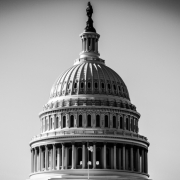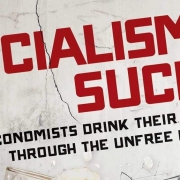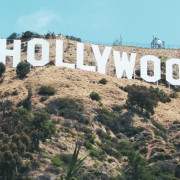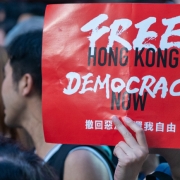Fifty years ago this week, at 10:30 on a warm night at the University of California, Los Angeles, the first email was sent. It was a decidedly local affair. A man sat in front of a teleprinter connected to an early precursor of the internet known as Arpanet and transmitted the message “login” to a colleague in Palo Alto. The system crashed; all that arrived at the Stanford Research Institute, some 350 miles away, was a truncated “lo.”
The network has moved on dramatically from those parochial—and stuttering—origins. Now more than 200 billion emails flow around the world every day. The internet has come to represent the very embodiment of globalization—a postnational public sphere, a virtual world impervious and even hostile to the control of sovereign governments (those “weary giants of flesh and steel,” as the cyberlibertarian activist John Perry Barlow famously put it in his Declaration of the Independence of Cyberspace in 1996).
But things have been changing recently. Nicholas Negroponte, a co-founder of the MIT Media Lab, once said that national law had no place in cyberlaw. That view seems increasingly anachronistic. Across the world, nation-states have been responding to a series of crises on the internet (some real, some overstated) by asserting their authority and claiming various forms of digital sovereignty. A network that once seemed to effortlessly defy regulation is being relentlessly, and often ruthlessly, domesticated.
From firewalls to shutdowns to new data-localization laws, a specter of digital nationalism now hangs over the network. This “territorialization of the internet,” as Scott Malcomson, a technology consultant and author, calls it, is fundamentally changing its character—and perhaps even threatening its continued existence as a unified global infrastructure.
The phenomenon of digital nationalism isn’t entirely new, of course. Authoritarian governments have long sought to rein in the internet. China has been the pioneer. Its Great Firewall, which restricts what people can read and do online, has served as a model for promoting what the country calls “digital sovereignty.” China’s efforts have had a powerful demonstration effect, showing other autocrats that the internet can be effectively controlled. China has also proved that powerful tech multinationals will exchange their stated principles for market access and that limiting online globalization can spur the growth of a vibrant domestic tech industry.
Several countries have built—or are contemplating—domestic networks modeled on the Chinese example. To control contact with the outside world and suppress dissident content, Iran has set up a so-called “halal net,” North Korea has its Kwangmyong network, and earlier this year, Vladimir Putin signed a “sovereign internet bill” that would likewise set up a self-sufficient Runet. The bill also includes a “kill switch” to shut off the global network to Russian users. This is an increasingly common practice. According to the New York Times, at least a quarter of the world’s countries have temporarily shut down the internet over the past four years.
Most assertions of government authority aren’t quite so heavy-handed. Recent years have seen the emergence of a softer form of digital nationalism, evident in the proliferation of so-called data localization (or data protectionism) laws in countries as varied as Vietnam, India, Argentina, Venezuela and Nigeria. Broadly, these laws take two approaches. Some countries require that data on their citizens (or certain types of data, such as medical or financial information) must be physically stored on servers within their countries. Others allow the data to leave their borders but insist on a copy remaining domestically.
Many of the justifications cited for such laws are valid, ranging from privacy concerns to national security. But sometimes the very real failings of the internet, such as hate speech and disinformation, are co-opted to justify laws that give repressive governments a way to monitor online activity and speech. For all of the undeniable faults of the multinational tech companies, a Vietnamese or Cambodian dissident might still prefer their information to be under the control of Google or Facebook rather than their own governments.
According to a recent study by a Brussels think tank, at least 45 countries now have some version of data localization requirements in place. The trend is no longer restricted to authoritarian states. Australia, Canada, New Zealand, South Korea and Switzerland are among the countries that now restrict cross-border flows of data. The European Union’s influential General Data Protection Regulation (GDPR), while not specifically about localization, imposes such stringent obligations that it makes it hard for companies to move data across borders, thus effectively serving as a similar requirement.
The cumulative effect of all these laws is starting to be felt throughout the network. Companies that work with data in multiple jurisdictions are among the hardest hit. Peter Yared, the founder of InCountry, a San Francisco startup that helps businesses comply with international data regulations, says that companies are struggling to understand local requirements, purchase or rent servers, hire staff and deploy new software to comply with a panoply of emerging (and often fluctuating) laws. “People in compliance, information security and technical operations departments are starting to sweat a little bit right now,” he says. “It hasn’t quite hit business leaders yet that they could face large fines or be ejected out of large markets like India.”
Many of these laws are ostensibly designed to rein in Western multinationals, but bigger companies are generally better able to accommodate the resulting uncertainty than smaller ones, which lack the necessary resources. Likewise, developing countries, often at the forefront of digital nationalism, could end up being among its chief victims. Countries such as India and the Philippines have important outsourcing sectors that rely on a unified global information network. Their moves to set up roadblocks on that network could come back to haunt them.
The great risk is that digital nationalism will Balkanize the internet, breaking it up into a patchwork of incompatible and irreconcilable fiefs. To an extent, this scenario, sometimes referred to as Splinternet, is already happening at the level of content and services. China’s population (around a fifth of humanity) does not have access to Wikipedia, Facebook and most of Google. When the EU’s GDPR first came into effect, many American media companies decided that the safest course of action, at least temporarily, was simply to stop offering their content to European consumers.
This Balkanization also could play out in the internet’s underlying core technical infrastructure. Over the last decade, several countries, citing cultural sensitivities, have considered banning or otherwise restricting the .xxx top-level domain name (generally used for pornography), raising the prospect that the internet’s naming system could eventually fracture. Responding to Edward Snowden’s revelations about U.S. spying, Brazil mooted the idea of building a separate undersea cable link to the EU to bypass existing internet infrastructure. And recent debates at the Engineering Task Force, a key internet standards committee, have sometimes been tense. In the lead-up to the introduction last year of a new security standard, representatives who wanted to maintain a backdoor for government agencies clashed with those advocating more robust encryption.
None of these debates has so far managed to shake the underlying foundations of the network, but the prospect of a technical Splinternet is no longer as inconceivable as it once was. In the decades ahead, we may look back wistfully to a time when data could move freely across the globe, without virtual customs or immigration checkpoints.
The internet was never just a technology or an engine of globalization. It was, at its core, an idea. Stefaan Verhulst, a co-founder of the GovLab at New York University (a think tank where I am a senior fellow), argues that, in its early days, the internet was very much a project of classical liberalism, embedded with “ideals like human rights, freedom of expression and free trade. If you care about those notions, then internet fragmentation is a problem.”
Like classical liberalism, the internet may also be a good idea in urgent need of updating. Much as the individualism and freedom of classical liberalism have been distorted into the inequalities and ethical transgressions of modern capitalism, so the internet’s culture of “permissionless innovation” has been abused, transformed into the centralized, controlled network of today. The original dream of an unfettered global public sphere is probably over. Understanding why that happened is the first step to reclaiming at least part of the original vision and to mitigating the most damaging effects of digital nationalism.
It’s no coincidence that the rise of digital nationalism corresponds with a similar resurgence of its offline variety. A technology community that has long prided itself on its radical difference, its apartness, turns out to be susceptible to many of the trends that influence the world at large. Over the last decade or so, the internet has suffered the same distortions of wealth and power—and the same resulting resentments—that have spurred the rise of illiberal nationalism and populism. Google today accounts for around 90% of online searches around the world; Facebook and Google together draw an estimated 84% of global advertising dollars (excluding China). Amazon accounts for 49% of online spending in the U.S., and Alibaba claims 60% in China. This was not the original dream.
Many of the anxieties to which this consolidation of power has given rise are legitimate; some are spurious and are used to advance ulterior motives. It has all been fertile ground for digital nationalism. When governments call for regulation to combat fake news, they tap into real concerns over the unaccountable power of social media; they also open up avenues for censorship. When developing countries insist on keeping their citizens’ data to combat “data colonization,” they raise genuine issues about the Western, especially American, bias of the internet; they also create backdoors to eavesdrop on citizens and erect barriers to protect local commercial interests. Modern nationalism, as the Harvard sociologist Bart Bonikowski has noted, depends on the widespread “mobilization of resentment”; this is true of both its digital and offline variants.
It turns out that the way to deal with offline and online nationalism may be quite similar: Restore a sense of inclusiveness and fair play, flatten some of the sharpest inequalities and rediscover and stress the principles that made the network so inspiring (and radically creative) in the first place. As it happens, there is a tool kit, both existing and emerging, to do some of this.
Mr. Verhulst, from the GovLab at NYU, argues that laws and principles from a previous era should be updated for the 21st century, by applying telecom universal service obligations to broadband, for example, and diversity and equal-time rules (sometimes applied to radio and television) to large news and social media networks. “It’s not like we don’t know how to go about this,” he says. “We just have to be more creative and think of what we can learn from models that were used in the past.” Competition law is another area that has received a lot of attention, specifically the need to update its provisions to take account of the (nominally) free business models practiced by many digital companies.
Another idea is to develop “club”- or “zone”-based approaches to running the internet—discrete, interconnecting blocs whose nation-members would make commitments to liberal principles like free trade, privacy and freedom of expression. Such blocs would be a far cry from the original vision of a single global network. But adherents, like Geoff Mulgan, the former head of Nesta, a British innovation foundation, argue that such “coalitions of the willing” are the best way to arrest the continuing fragmentation of the network. “I don’t see what the alternative is,” Mr. Mulgan says. “The old global vision is breaking up.”
The question is no longer whether national governments should have a say but what form their authority will take and how it will ultimately shape the network. In the old vision, nation-states were the enemy of innovation and freedom. Those were the Wild West days, and it is understandable that internet purists—and many average users—are nostalgic for them.
But things have changed a lot since that first email was sent in California. Amid the creeping nationalism and illiberalism of today, we may no longer have the luxury of rejecting governance and governments. Fifty years after the birth of the internet, it may well be that national governments, wielding enlightened regulation, are the last best hope for maintaining a network that is—at least relatively—open and free.
Mr. Kapur is a senior fellow at the GovLab at New York University. This article first appeared at wsj.com



















